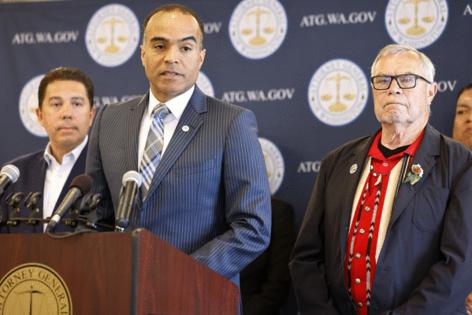Wash. AG warns of 'race-based policing' after Supreme Court decision
Published in Political News
Washington Attorney General Nick Brown warned of possible race-based policing across this country" and a rollback of decades of civil rights progress following a U.S. Supreme Court decision this week that authorized federal immigration enforcement in Los Angeles to consider race and ethnicity in determining who they stop and question.
"It is a shameful decision," Brown said of Monday's decision in the L.A. case, Noem v. Perdomo. "It basically says that people of color in the United States of America, regardless of their citizenship, are second-class citizens in the eyes of the law."
Brown has sued the Trump administration 37 times in his first nine months in office.
On Wednesday, he accused the president of refusing to "follow the law, follow the Constitution." He said his office was examining legal actions in case the president followed through on threats to send the National Guard to aid in law enforcement in Seattle, as it has done in other Democratic-controlled cities.
"I don't believe the president or the administration is utilizing the National Guard for public safety reasons," Brown said. "I think they're using it as a pretext for the authoritarianism that we're seeing from the Trump administration."
As the Trump administration has increased its immigration enforcement crackdown across the country, masked federal agents in L.A. and other places have stopped and detained people on the street and at workplaces to ask about their legal status.
Following a lawsuit, a federal judge in L.A. ruled that federal agents were likely violating constitutional rights, by detaining people without reasonable suspicion. The judge barred immigration enforcement from stopping people based on their location, the work they do, their language or accent and their race or ethnicity.
An appeals court agreed.
But the Supreme Court, by a 6-3 vote, overturned the lower court. The majority offered no explanation for its decision.
But Justice Brett Kavanaugh explained his vote, in a concurrence, arguing that a person's presence at a place where undocumented immigrants often work — car washes or farms, for instance — combined with the language they speak and their ethnicity can be enough to provide "reasonable suspicion" that they are in the country illegally.
"There is an extremely high number and percentage of illegal immigrants in the Los Angeles area," Kavanaugh wrote, adding that they tend to gather in specific locations to seek daily work. "Many of those illegally in the Los Angeles area come from Mexico or Central America and do not speak much English."
He wrote that race or ethnicity "alone" cannot provide reasonable suspicion for a stop, but "it can be a relevant factor."
Seattle Mayor Bruce Harrell said the ruling would "cause a lot of anxiousness and angst among all of our city."
"I think it gives a legal framework by which racial profiling and inhuman treatment can occur by ICE officials, and that gives us incredible concern," Harrell said.
Brown, at a news conference Wednesday, said it was important to recognize the gravity of the ruling. While it officially applies only to ICE agents in L.A., Brown said it "is going to have an immediate impact on how ICE operates across this country."
"I do think it really just opens the door for not only federal law enforcement and immigration enforcement but local and state law enforcement to also consider race," he said.
He noted it was just three years ago that the Supreme Court, in striking down affirmative action at colleges and universities, ruled that race could not be considered in any way in college admissions.
"Eliminating racial discrimination means eliminating all of it," the majority opinion in that case reads.
But in this week's immigration case, the same conservative majority seemingly changed course.
"What they said on Monday was the opposite of that," Brown said, "that in fact race could be used to detain people, to take away their liberties, to take away their freedoms."
"If these were normal times, this kind of outrage would generate a great deal of response across the country, instead the decision by the Supreme Court was just another Monday, Brown said.
_____
Seattle Times staff reporter Catalina Gaitán contributed to this report.
_____
© 2025 The Seattle Times. Visit www.seattletimes.com. Distributed by Tribune Content Agency, LLC.
























































Comments